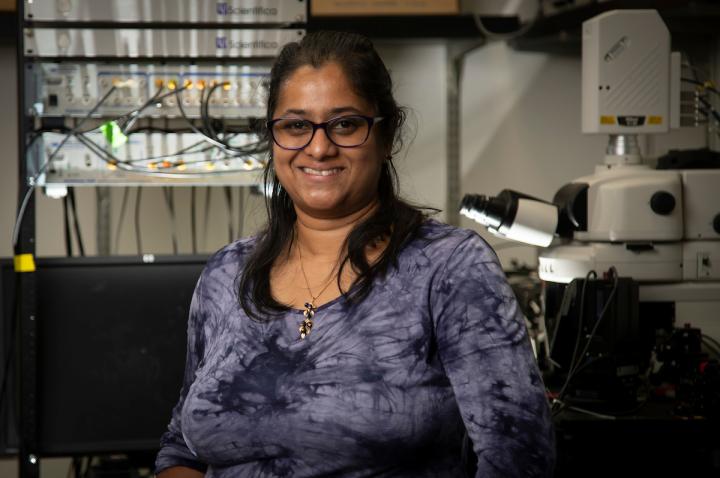$2.3 million renewal grant to UC Riverside will support a five-year project
RIVERSIDE, Calif. — Viji Santhakumar, an associate professor of molecular, cell and systems biology at the University of California, Riverside, has received funding from the National Institute of Neurological Disaster and Stroke of the National Institutes of Health to further pursue research on moderate concussive brain injury, which results from car accidents or sports-related concussions.
The more than $2.3 million five-year renewal grant will allow Santhakumar’s lab to study how inflammatory responses after brain injury contribute to the creation of abnormally connected neurons, and whether this compromises critical memory processing functions.
“We expect this research project will provide fundamental insights into how memory deficits and epilepsy develop after brain injury,” said Santhakumar, who joined the UC Riverside faculty in 2018. “It will help us identify potential early therapies to prevent the development of epilepsy as well as memory and cognitive issues after brain injury.”
A concussion is a traumatic brain injury that affects brain function. Usually not life threatening, they can cause serious symptoms requiring medical attention. Generally, concussion has three grades: mild, moderate, and severe.
An expert in epilepsy and traumatic brain injury, Santhakumar explained that the hippocampal dentate gyrus, where new neurons are born well into adulthood, is affected by concussive brain injury. The dentate gyrus plays essential roles in learning and memory, as well as in spatial navigation.
“Here we have an increase in the birth of new neurons after brain injury,” Santhakumar said. “But whether they are helpful or harmful — the excessive burst of new brain cells could lead to epileptic seizures and long-term cognitive decline — is being debated. We will be examining how the excess newly born neurons mature, connect with other neurons, and shape brain activity patterns. We hope to determine how these neurons influence memory processing and development of epilepsy after brain injury; and find mechanisms by which we can prevent memory deficits and epilepsy after brain injury.”
The research will be conducted in mice, a model system that has delivered insights in potentially treating several human diseases, including brain injury.
The project, which will likely support two graduate students and a postdoctoral fellow, will examine recordings of brain activity and behavioral outcomes while manipulating the activity of newly born neurons in the normal and injured brain.
“We will examine the role of specific immune receptors, and the pathways by which they alter neuronal birth and maturation,” Santhakumar said. “We will accomplish this by using drugs to block these receptors, which has a potential clinical value; and by deleting specific genes in neurons, enabling an examination of specific cell types involved.”
The project, which began April 1, is titled “Contribution of innate immune receptors to neurological dysfunction after traumatic brain injury: Mechanisms and therapeutic implications.”
The University of California, Riverside is a doctoral research university, a living laboratory for groundbreaking exploration of issues critical to Inland Southern California, the state and communities around the world. Reflecting California’s diverse culture, UCR’s enrollment is more than 25,000 students. The campus opened a medical school in 2013 and has reached the heart of the Coachella Valley by way of the UCR Palm Desert Center. The campus has an annual statewide economic impact of almost $2 billion. To learn more, email [email protected].
###
Media Contact
Iqbal Pittalwala
[email protected]





